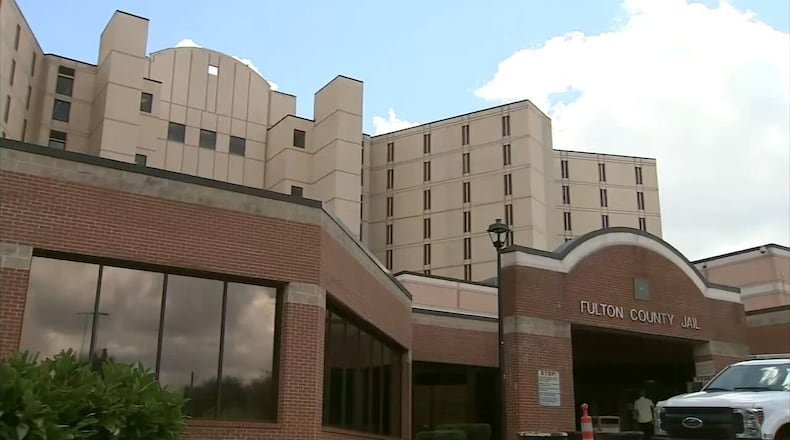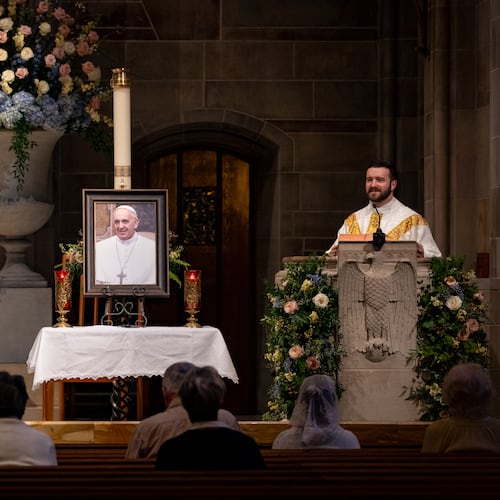The Fulton County jail population has steadily increased over the last five years due to procedures and policies that have driven the current overcrowding crisis, according to the long-awaited report from the Justice Policy Board.
In August, the Atlanta City Council approved an agreement to lease 700 beds at the Atlanta City Detention Center to Fulton, to help relieve overcrowding that some have called a “humanitarian crisis.”
But a stipulation to the agreement required a jail study. The Jail Population Review Committee studied trends over the past five years, and a Sept. 14 snapshot of all 3,218 detainees. The Committee also reviewed 250 cases from the population.
Officials in Atlanta Mayor Andre Dickens’ office this week said the report fulfills requirements of the council and they will move forward with the lease agreement.
The report found 3,462 people were jailed in Fulton this year for charges that were eligible for diversion. In the 250 reviewed cases, at least 75 people were in custody due to a bond of $15,000 or less. One person spent nearly 500 days in jail because he couldn’t pay bond. He was unindicted at one point in the system and a bond reduction wasn’t considered, the report found.
Several Fulton County officials — Sheriff Patrick Labat, District Attorney Fani Willis, Solicitor General Keith Gammage, and County Manager Dick Anderson — responded to the report in a letter to City Council on Monday.
“The JPB report does not take into account charges outside of Fulton County, and only looked at previous bookings from 2019 to 2022,” the letter said. “It would be overly simplistic to evaluate bond determinations based solely on these factors.”
Fulton officials said bonds are set based on several factors, such as repeat offenses. They also said a judge may grant bond regardless of whether a defendant has been indicted.
The report states 38% (4,886) of all bookings this year were for people charged with misdemeanors as their most serious charge. That percentage has held steady since 2018, according to the report.
In their letter, Fulton officials said bookings do not equate to people currently in jail, and they said less than 5% of detainees in Fulton’s jail are charged with misdemeanors only. The remaining 95% are charged with felonies, officials said.
The Committee also reviewed cases among people detained without violent offenses in their Fulton booking history, others clinically diagnosed with at least mild depression, and people booked for non-violent offenses at least three times within 24 months.
Credit: Steve Schaefer
Credit: Steve Schaefer
Those people accounted for more than one-third of the bookings, the report found. And they spent an average of 143 days behind bars this year.
In 250 cases, 35% of the inmates had delayed releases due to acute mental health or housing needs. One person charged with loitering has been in custody for over 310 days, according to the report.
Fulton officials said there are currently more detainees charged with murder than those charged with misdemeanors only. They said misdemeanor offenders often get released within a few days of arrest on a signature bond. However, several misdemeanor defendants are also charged with violent felonies preventing their release, officials said.
The report also called out issues in the data Fulton provided, such as an undercount in jail releases from 2016 to 2018, incomplete data on prior bookings, and “potential unreliability” in bond data.
The report comes as several advocates, including some city council members, urge Atlanta and Fulton to rely on pre-arrest services instead of incarceration. The JPB itself was formed last year as part of an agreement between Atlanta and Fulton to use the city detention center as a center for diversion services.
In a Nov. 18 letter from JPB co-chairs Fulton Judge Robert McBurney and City Councilmember Dustin Hillis, they urged City Council President Doug Shipman to empower them to keep researching policy recommendations to reduce the jail population with increased diversions and accelerated case flows.
Credit: Miguel Martinez
Credit: Miguel Martinez
But on Monday, officials from Fulton and the Atlanta Mayor’s office said the report fulfills the requirements outlined in the agreement. The city attorney is now tasked with preparing the documentation for Mayor Andre Dickens to sign to execute the lease, said Fulton’s county attorney at last week’s commission meeting.
Atlanta City Councilman Michael Julian Bond said the city is morally obligated to use detention center beds to help with the issue. He said the report wasn’t worth the 90 days that went by with inmates sleeping on the floor.
City Councilwoman Keisha Sean Waites said this issue requires state intervention, especially following reports of the jail’s mentally ill people suffering in feces and from malnourishment at one point this year. She said mentally ill people should be in a health facility instead of the criminal justice system.
“These are people who literally do not have the mental capacity to think or to take care of themselves. I believe we have a moral obligation to take care of them and to make good decisions that are in their best interests,” she said. “I’m not interested in letting out rapist and pedophiles.”
Keep Reading
The Latest
Featured





